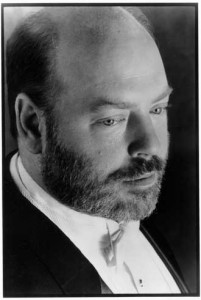
Schulich voice teacher on Grammy short list for performance award
By Chris Chipello
Schulich School of Music voice teacher Sanford Sylvan has no special plans to celebrate if he wins a Grammy Award on Sunday, Feb. 8.
“I’ll just be happy,” he said, smiling at the prospect during a recent interview. “Even being nominated is a lovely thing.”
Sylvan is one of five nominees for Best Classical Vocal Performance, for his recording as baritone soloist in composer Charles Fussell’s “Wilde,” an operatic reflection on writer Oscar Wilde’s life.
This isn’t the first time Sylvan has been shortlisted for the recording industry’s most prestigious award. He has been nominated three times in the same category. And he played Chou En-Lai in Nixon in China, a 1987 John Adams opera that garnered a Grammy and an Emmy award. The Nixon opera launched Sylvan’s international career. He has since won high praise from reviewers across North America – including for his performance in the movie version of “Death of Klinghoffer,” an Adams opera about the 1985 Palestinian terrorist hijacking of the cruise ship Achille Lauro in the Mediterranean.
“The baritone Sanford Sylvan should have received an Oscar nomination for his courageous portrayal of the murder victim Leon Klinghoffer, who was thrown from his wheelchair into the sea,” wrote a New York Times DVD reviewer in 2005.
Performing for the movies is a “very different experience” from the stage, Sylvan noted. For a film “you sit around for hours and you have to be fantastic for three minutes – which for singing is very difficult.”
Heaven on earth
A New York native who was based in Boston for 20 years, Sylvan is in his second year at McGill. Now, after years of near-constant travelling as a performing vocalist, “I pick and choose and sing only what I want – which is heaven – and I don’t usually perform more than once a month, which is even more heavenly.”
Sylvan works one-on-one for an hour every week with 20 Schulich students, “really looking through the vocal microscope.” In singing, “you are your instrument – it’s not outside of you.” Sylvan also coaches students in repertoire that he has already performed – including The Rape of Lucretia, the January opera at McGill. A role such as that of Lucretia’s husband, a general whose chaste wife is raped and later kills herself in his arms, is “a lot to understand” for a 20-year-old baritone, he noted.
The son of a trucker and a schoolteacher, Sylvan got interested in opera at the age of 12 after he happened to hear a recording of Aida. He auditioned at Juillard Prep – the famous performing arts school’s pre-college conservatory – and was accepted at the unusually young age of 13. “I looked older, and my voice had changed,” Sylvan explained.
At Juilliard, he was trained by William Toole, the first in a series of “great mentors.” Sylvan went on to study at the Manhattan School of Music. He also spent summers at the Tanglewood Music Center in the Berkshires, where he met his “biggest mentor,” the American soprano Phyllis Curtin
At Tanglewood, Sylvan heard about the lively music scene in Boston – and moved there after finishing school in 1977. “That was unheard of in those days. You weren’t supposed to do that. You were supposed to stay in New York.” Craig Smith, a conductor who led weekly performances of Bach cantatas at Boston’s Emmanuel Church, became “my next great mentor.”
Making ends meet
For a while, Sylvan supplemented his income by teaching and by working at Barnes & Noble. But after the success of Nixon in China, he began making his living solely from singing.
Sylvan was scouted by Schulich during a visit to Montreal to sing in a concert by his pianist, David Breitman, who is from Montreal. “I didn’t know, at the time, that the voice department was looking for a teacher. So I came and sang songs and did the master class, like I always do … and all of a sudden they were talking to me about a job.”
In an interview with the Boston Globe before he left for Montreal, Sylvan said he was moving because of McGill and the level of its students. “McGill is like Harvard and Juilliard smashed together, for Canadian kids.”
That comment, understandably, still resonates in the halls of Schulich. “All of a sudden, I heard this kid say it, and I thought, ‘Wait a second, I said that!’”
One thing Sylvan underestimated was just how cold Montreal winters can get. “I’m a very tough guy – I don’t react usually to this kind of thing, and I have to say that this year I was surprised.” So he’s looking forward to a trip to Australia to perform in late February, at the time of the school break. “It’s going to be warm,” he says, his sotto voce swelling into a booming laugh, “which I’m very excited about.”
